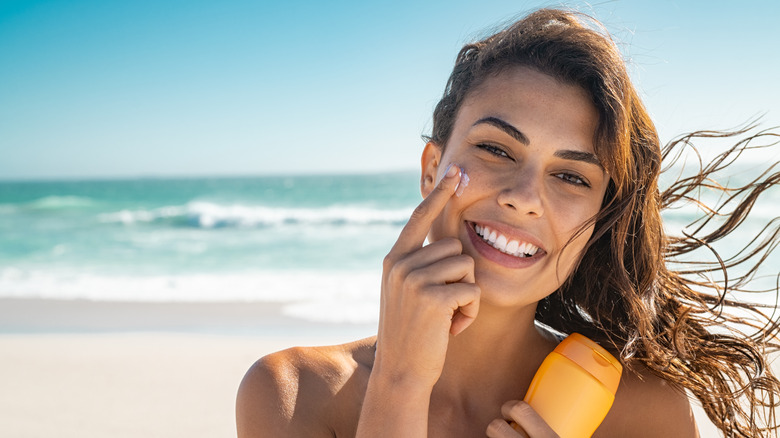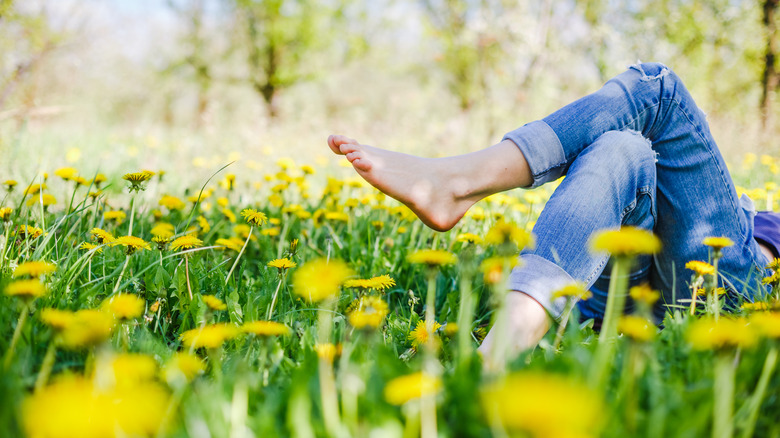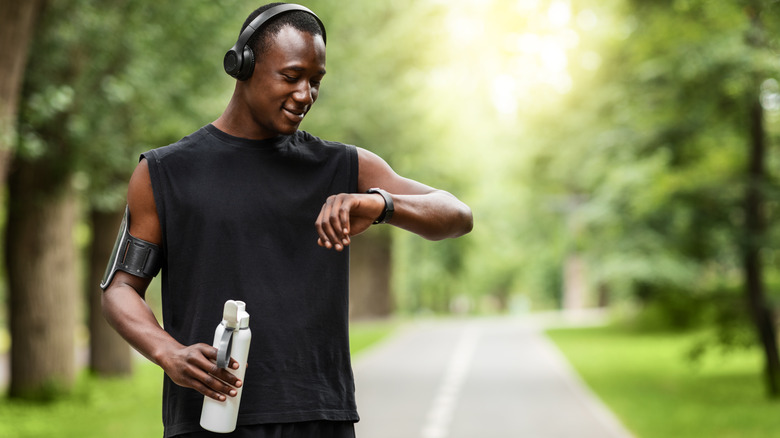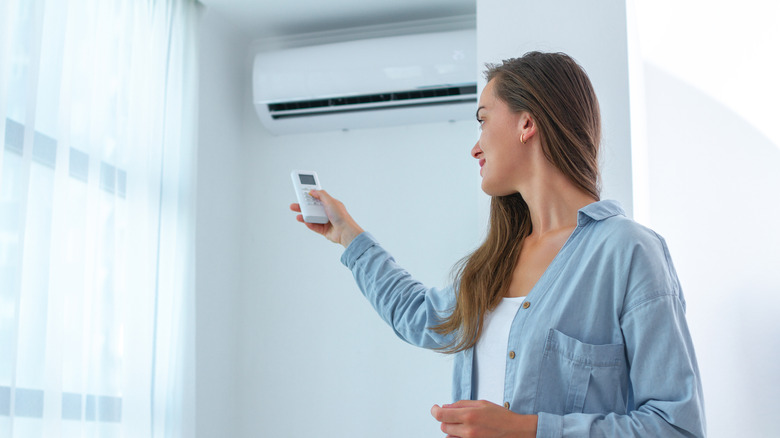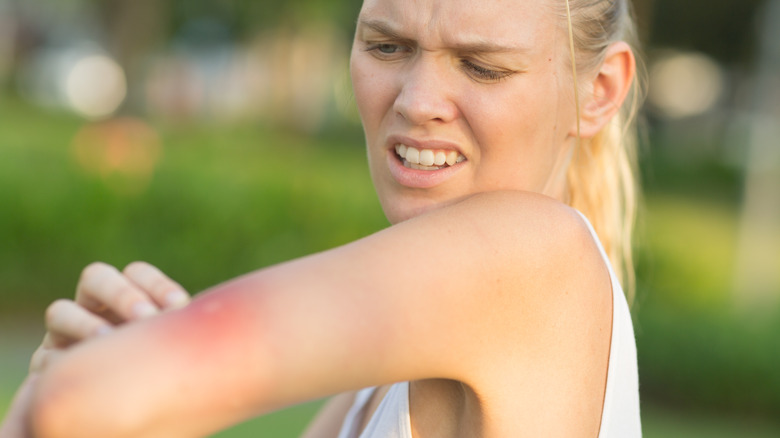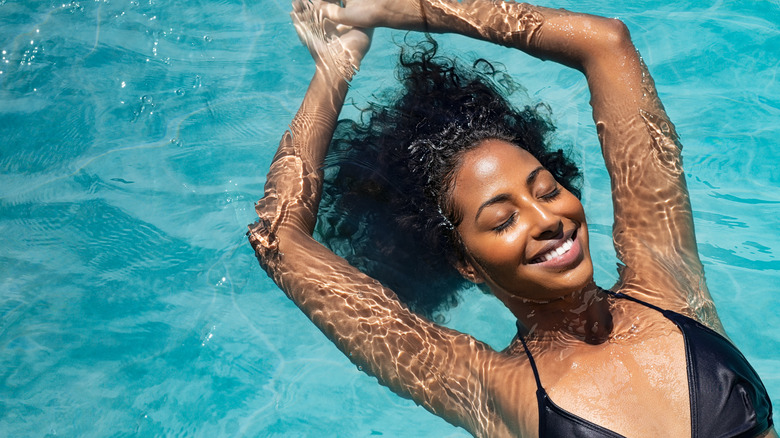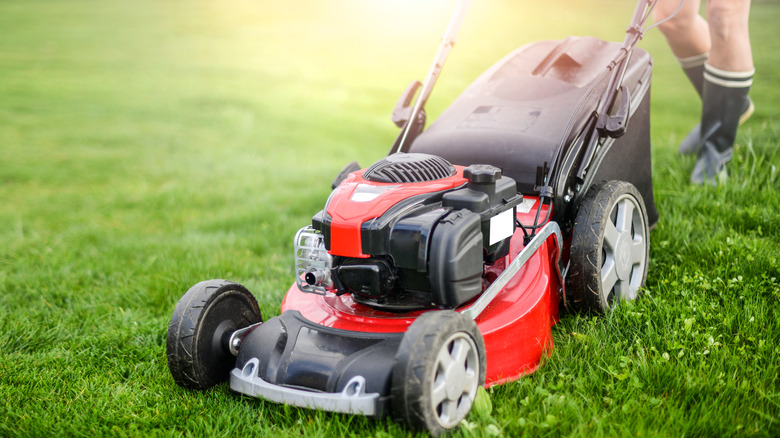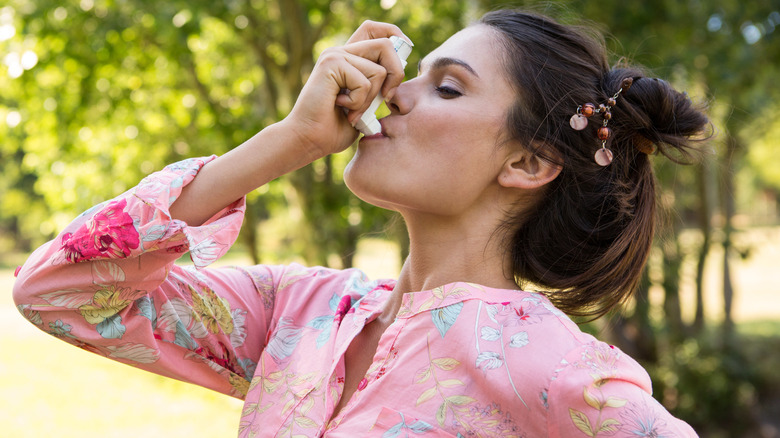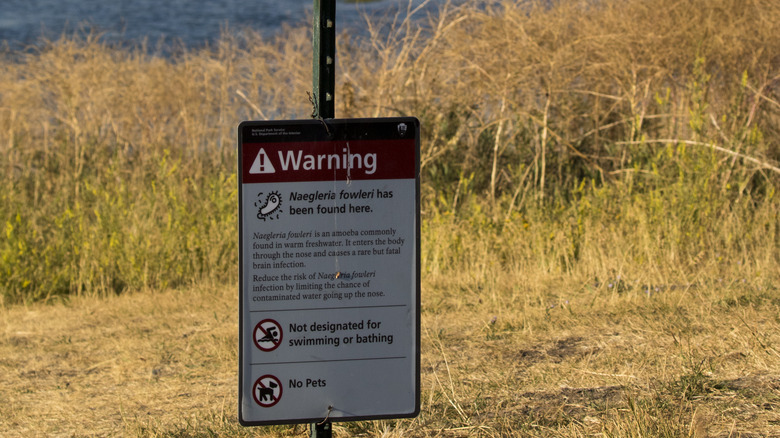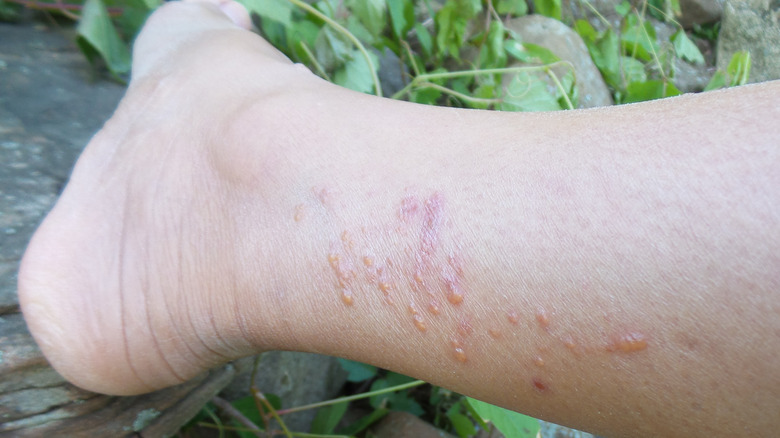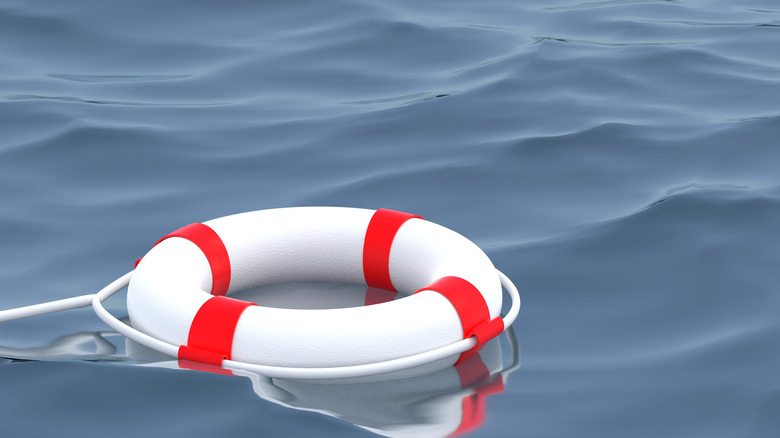Health Dangers Of Summer You Wouldn't Expect
If you are anything like us, you probably count down the days and hours until summer's official arrival. After months of being stuck indoors, enduring cold temperatures and unfavorable conditions, how can you not be stoked for sun, sand, surf, and all the sizzling perks of the hottest season? (Bring it on!)
But before you start bikini shopping or planning beachfront getaways and poolside barbecues, you should at least familiarize yourself with a few of the less-than-amazing things that also come with the summertime territory. In fact, some of the drawbacks can have serious effects on your health and well-being. Don't worry, we're not saying that you can't or shouldn't enjoy your favorite season, we're just advising you take heed and take some precautions.
Curious to learn about a few of the hidden dangers you might not expect? Read on so you can approach every summer excitedly prepared — and then go ahead and resume that swimsuit search! You want to feel good and look great come mid-June.
You can get a sunburn on a cloudy summer day
You may slather your face and body in sunscreen for a sunny day trip to the beach. But what about on cloudy mornings and cool afternoons? Let's be honest, you're probably more inclined to skip this skin care step altogether. The truth is, though, that you could be doing major damage to your complexion. The sun and its harmful rays are still very much there — even if you can't as readily see or feel them at work. In fact, the season and temperature are almost irrelevant (via American Cancer Society).
Dr. Deborah S. Sarnoff, president of the Skin Cancer Foundation, told SkinCancer.org, "Even when it's cold or overcast, UV rays that cause skin aging and skin cancer are reaching your skin." Moreover, according to the foundation, UVA rays can and do "penetrate through clouds and fog." They can even get through glass. If you will be driving in your car or enjoying the view from your floor-to-ceiling windows, you should still apply your SPF.
Basically, the gist of it is this: Don't go a day without your trusty sunscreen. Your skin will thank you.
You can get sunburn of the eye if you don't take precautions in the summer
Forgot your favorite pair of sunglasses at home? No biggie, you can squint your way through the day, right? Not so fast. According to the American Academy of Ophthalmology (AAD), just like your skin needs SPF, your eyes also require protection from the summer sun — especially if you will be spending the day lounging at the beach or chilling by the pool.
The sun's strong rays reflect off of the water and sand, and without adequate shielding, you could end up with a painful case of photokeratitis, or "sunburn of the eye" (via AAD). This happens when "UV rays burn the surface of the eye," according to the AAD. Sounds terrible, doesn't it? Its unpleasant effects include blurry vision, eye soreness, and redness. It is usually temporary, but it's certainly not convenient — and, what's more, it's easily preventable.
According to the AAD, you can avoid the annoyance, and the discomfort, with shades that boast 100 percent UV protection (hot tip: keep a spare pair in your car) and a wide-brimmed sun hat.
Going barefoot can prove dangerous in the summer months
Love shedding your restrictive shoes in the summer and letting those piggies of yours get some fresh air? Maybe think twice before you walk outside without protection. For starters, Dr. Andrew Shapiro, a podiatrist and spokesman for the American Podiatric Medical Association, warned that going barefoot can expose your vulnerable extremities to sharp objects and bacteria. He explained to Live Science that those with diabetes and other conditions that result in circulation problems are at greater risk of infection.
Furthermore, Shapiro elaborated that anyone who dares ditch their summertime tennies may have a harder time gripping the ground, and they could be putting excessive stress on some bones and ligaments. On top of these concerns, dermatologist Lauren Ploch told the site that there's also the potential of contracting Plantar warts or athlete's foot. So, at bare minimum, put on a pair of flip flops before you trudge through the public pool's locker room.
Although rubber sandals are surely better than nothing, you should swap them out for a more supportive shoe more often than not. According to research cited by Harvard Health Letter, wearing them regularly can affect the way you walk and lead to serious ankle issues — and even hip problems.
You are more prone to dehydration in the summer
Spending the whole day outside in the summer heat, the sun blazing down on you, is a joy of summer. But it can also be problem. If you are not being careful, you may find yourself dehydrated — and that can eventually lead to heat exhaustion or heat stroke, as noted by Healthline.
Fortunately, there are a few proactive steps you can take to avoid this. Arguably, the most important three: Hydrate, hydrate, and hydrate. Remember, when you sweat more, you are actively losing more fluids, so it is super important to replenish. And, by the way, if your pee is dark yellow in color, it is time to start chugging another bottle of H20.
What's more, pay attention to any symptoms that may indicate heat exhaustion or sun stroke. Dizziness, nausea, headache, and fatigue are among the most common signs (via Centers for Disease Control and Prevention).
Your AC units could be harboring mold
Nothing feels as refreshing and invigorating as blasting the AC on high when you walk into the house hot, sweaty, and tired. Of course, while the frigid air might cool you down quicker, it could also be exposing you to mold.
Chris Regan, air-condition lab senior test project leader for Consumer Reports, explained that mold can initially appear in the form of small black dots on the openings where cold air blows out. But this is just the tip of the iceberg, and may indicate that the inner workings of the machine are harboring more mold. Scientist Mark Mendell told the publication that a mold-filled air conditioner "would increase your chances of having a respiratory infection."
So what should you do to ensure your machine is clean? For starters, make sure portable units are regularly drained, and position a window unit so that it tilts toward the exterior of your home so rain can't collect. And if you spot those tell-tale black dots? Clean them out. But if they reappear a few days or weeks later, it's probably time to replace the unit altogether (via Consumer Reports).
Summer stings, bites, and Lyme (oh my!)
You know that bugs come with the territory of summer. Bees, mosquitos, and wasps are all par for the seasonal course (via Healthline). While some stings and bites are relatively harmless, others can cause serious issues for your health. Of course, if you are allergic, you know that you have to be extra careful about avoiding the offending bug. But everyone needs to be aware of the dangers of ticks.
As noted by the Centers for Disease Control and Prevention, approximately 300,000 people in the United States get Lyme disease each year as a result of tick bites. To this end, you will want to remain alert and do everything you can to avoid these nasty bloodsuckers.
First, know that ticks thrive in grassy turf and humid environments. Some bug repellent sprays can help deter these persistent pests. Moreover, it is critical to check yourself, your children, and even your pets after outdoor outings. Ticks like a few nifty hiding spots, so pay special attention to the underarms, around the ears, near the belly button, between the legs, behind the knees, around the waist, within body hair, and on the head (via CDC).
You could get a case of swimmer's ear in the summer
If you are practically a fish come summertime, you could be more at risk for developing otitis externa, otherwise known as swimmer's ear. As explained by the Mayo Clinic, this outer ear canal infection is caused by water that stays in your ear after you go for a float or swim. Basically, your ear remains moist and becomes a breeding ground for bacteria.
If your ear is incessantly itchy or hurting, if you experience redness and swelling, or have discharge, a fever, and trouble hearing, you will want to visit your doctor. It can easily be treated with drops. Better yet, you can try to prevent it in the first place by drying your ears after you get out of the water. Simply (and gently) wipe the outer part down with a towel. Note: You should never stick items in the ear canal as this can drive bacteria further in and disrupt the ear's delicate barrier (via Mayo Clinic).
There may be E. coli (and other bacteria) at freshwater beaches
Nothing feels more like summer than burying your feet in the hot sand. But when you dip your toes, you could also be exposing yourself to — gulp — fecal matter. As pointed out by Live Science, the reality is that freshwater beaches in the United States are quite commonly closed because of "fecal contamination." This can be caused by "septic systems overflow or malfunction, or if a lot of birds happen to be in the neighborhood."
Horrifying as this may sound, the good news is that research cited by the publication noted that "very few of the E. coli present on the beach are potentially harmful to humans." Don't breathe a sigh of relief just yet, though.
Many other types of "microbes that tend to travel in the same waste streams, such as Salmonella, are more of a worry to health officials." So there you have it. Try not to get sand or fresh water in your mouth — and wash or at least sanitize your hands before you have your beach snack.
Don't undermine the possibility of lawn mower-related injuries in the summertime
Approximately 6,394 people in the United States are sent to the emergency room each year with a lawn mower-related injury, according to a 2018 study published in Public Health Reports. It can happen to children and adults, and these accidents can range from burns to broken bones to even amputations. Worse yet, these accidents can be fatal. This is one reason it's so critically important to mow with caution. And despite what you may have heard, mowing the lawn is not a chore for a child.
Less serious, but still bothersome? Mid-mowing allergy attacks. Sneezing, wheezing, and running may make doing your outdoor cleanup a little more challenging (and uncomfortable), so try to take some precautions. Pollen levels are generally highest in the morning, so try to do your work a bit later in the day if possible. You may also consider wearing eye protection or sunglasses to deter some of the offending allergens from approaching your sensitive eyes. And, finally, you may want to wear a filtering mask while doing your yard work.
The spoils of a perfect picnic could mean food poisoning
Nothing says "fun in the sun" like a beautiful picnic at the park. Food, family, and fresh air — what could possibly go wrong? Well, if your al fresco event is long and leisurely, your picnic fare might not remain edible. As explained by the Centers for Disease Control and Prevention, "rates of food poisoning increase in summer months because bacteria grow faster in warmer weather." In other words, you could get sick if you eat left-out-in-the-heat colds cuts, cheeses, and fruits.
As advised by the CDC, make sure that leftovers are refrigerated within two hours of cooking time; this amount of time is cut in half if it's over 90 degrees Fahrenheit outside. When the countdown clock runs out, all the perishable eats should be thrown in the trash.
Another option, especially for those of you who don't want to waste food: Get yourself a high-quality cooler. Business Insider's top pick is the Coleman Performance 48-Quart Cooler, as it boats a "three-day ice retention in 90-degree temperatures" and an affordable price.
Asthma could be exacerbated in the summer months
Managing asthma is never a walk in the park, but doing so in the summer months can be especially challenging. Dr. Pat Bass, a board-certified internist, explained in an article for Verywell Health that "the mere fact that you have asthma means your lungs are especially sensitive to extreme heat."
In other words, simply inhaling and exhaling on a super hot day can exacerbate your symptoms. Moreover, if it is humid, the heaviness of the air makes it even more difficult. Finally, if your asthma is triggered by allergens, the seasonal pollen count isn't doing you any favors either.
However, you do not have to give up your summer to keep your asthma in check. Just make sure you are prepared. And if it's a really hot and humid day — or the pollen count is sky high? Try to stay indoors with the humidifier and cool air blowing (via Verywell Health).
Brain-eating amoebas are uncommon but life-threatening
Rare, but deadly. That's one way to describe Naegleria fowleri, a brain-eating amoeba that can live in small bodies of fresh water. It can also inhabit pools that are not properly chlorinated and contaminated tap water. It is more likely to be found in the southern states of the U.S., but it is possible that it can be present in the north, too, during the summer months (via the Centers for Disease Control and Prevention).
When your head is under water, these microscopic amoebas can enter through the nose and rapidly make their way to your brain, causing meningoencephalitis, a severe infection that destroys the brain tissue.
Per the CDC, 34 cases were reported in the United States between 2010 to 2019. As such, it's not a common occurrence. Nevertheless, it is usually fatal. If you come across any posted warnings at the lake, forgo your dip. If you suspect that a pool is not disinfected or well maintained, steer clear.
Poison ivy and other plants could leave you with a rash come summertime
Leaves of three, let it be! Poison ivy is lurking, and you don't want to deal with the itchy, blistery aftereffects of touching this plant. You will want to be extra cautious when exploring woodsy areas or going for a summer hike in a new environment.
As noted by the Mayo Clinic, coming into contact with poison ivy will result in pain, itchiness, swollen skin, and redness. Irritation can emerge within hours — or it may take a bit longer. Either way, it'll resolve within a few weeks, but it will most likely be uncomfortable while it lasts. Some topical products offer relief, and you should consult your doctor about severe cases.
Poison ivy isn't the only plant to look out for in the summertime. Wild parsnip can also cause the skin to flare up. This happens when you come into contact with the sap. Although the sap is a risk at other times of the year, it has "increasing potency from spring to summer," according to Minnesota Department of Transportation. Not sure what to look for? In the summer months, this plant can be recognized by big clumps of yellow blooms on a fat stem.
Water safety needs to remain a priority in the summer
If you are an adult who knows how to swim, you may not even think twice about the dangers that a deep or open body of water can present — although you should. When swimming at the beach, look out for, and avoid, rip currents, as advised by the American Red Cross.
If you do happen to get stuck in one, remain calm first and foremost. You shouldn't attempt to fight against a rip current; instead, "swim parallel to the shore until you are out of the current. Then, turn and swim to shore," the organization advised. You can also try to "float or tread water until you are free." If you are unable to successfully and safely get to the shoreline, try to get a lifeguard's attention. Even skilled swimmers are no match for one of these currents, and children are especially vulnerable. Make sure an adult is present and actively watching kids swimming in the ocean.
In fact, it's important to watch children closely no matter the body of water — including the bath — to prevent drowning. Additionally, dry drowning occurs more frequently in children, and it happens after someone has left a dangerous water situation. According to WebMD, water never gets to the lungs in this instance. "Instead, breathing in water causes your child's vocal cords to spasm and close up. That shuts off their airways, making it hard to breathe."


